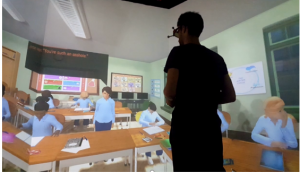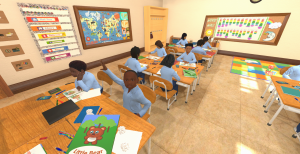Cyberlearning and Training on Social Skills in Virtual Reality
Modeling Emotions for Training in Immersive Simulations (METIS)

METIS experienced in immersive VR
Current studies on training social skills in immersive virtual reality do not address whether emotions displayed by 3-dimensional virtual agents provide the same type of user experience when interacted with across different virtual reality (VR) platforms, ranging from PC regular display, to PC with Head-Mounted Displays, to fully immersive cave automatic virtual environments (CAVE).
We are interested in studying the effects of these various VR platforms, and of the display of social behavior (e.g. facial expressions, gestures, body language) on human-computer interaction measures, such as presence, co-presence, engagement, and believability. Our current cross platform prototype (Delamarre et al., 2020) is a start to study these research questions, which are applicable to a wide range of social skills training involving emotional social cues.
- Delamarre, A., Buche, C., and Lisetti, C, (2020). Modeling Emotions for Training in Immersive Simulations (METIS): a Cross-Platform Virtual Classroom Study. In Proceedings of the IEEE International Symposium on Mixed and Augmented Reality (ISMAR 2020).
- Delamarre, A., Buche, C., and Lisetti, C., (2020). A Cross-Platform Classroom Training Simulator: Interaction Design and Evaluation. In Proceedings of the 19th International Conference on Cyberworlds (CW2020).
- Delamare, A., Buche, C., and Lisetti, C. (2019). AIMER: Appraisal Interpersonal Model of Emotion Regulation, Affective Virtual Students to Support Teachers Training. In Proceedings of the ACM international Conference on Intelligent Virtual Agents (IVA 2019), Paris, FRANCE.
Interactive Virtual Training for Teachers (IVT-T)

One of IVT-T virtual classrooms.
We built the Interactive Virtual Training for Teachers (IVT-T) system to help inexperienced new teachers improve their classroom management skills by safely practicing with disruptive virtual students. Without IVT-T, early career teachers learn their skills from traditional lectures on classroom management, and do not have much opportunities to test their knowledge in a safe environment.
We derived design principles and implementation constraints for the implementation of VR training systems for teachers (Delamarre et al., 2021), and evaluated IVT-T from multiple perspectives: its usability (Shernoff, E.S. et al., 2020), how it is used by teachers (Shernoff, E.S. et al., 2021), and whether teachers with IVT-T training improve their classroom management skills over teachers without such training (article forthcoming).
- Delamarre A., E. Shernoff E., Buche C., Frazier S, Gabbard, J.,and Lisetti, C. (2021). The Interactive Virtual Training for Teachers (IVT-T) to Practice Classroom Behavior Management. International Journal of Human-Computer Studies, 152(1), p. 102646. [PDF]
- Shernoff, E.S., Frazier, S.L. C., Lisetti, Delamarre, A., Bibi, Z., Gabbard, J. (2021). Supporting the Implementation of Evidence-Based Behavior Management Practices through Simulation: A Mixed Method Study. Journal of Educational Computing Research, pp. 1-35, https://doi.org/10.1080/10474412.2021.1875840.
- Shernoff, E.S., Von Schalscha, K, Gabbard, J., Delamarre, A., Frazier, S. Buche, C., Lisetti. (2020). Evaluating the Usability and Instructional Design Quality of Interactive Virtual Training for Teachers (IVT-T). Educational Technology Research and Development Journal, 68, pp. 3235-3262, https://doi.org/10.1007/s11423-020-09819-9.
- Delamare, A., Buche, C., Shernoff, E., Frazier, S., and Lisetti, C. (2019). Lifecycles and Representational Fidelity Evaluation of a 3D Interactive Virtual Training for Teachers. In Proceedings of the ACM international Conference on Intelligent Virtual Agents (IVA 2019), Paris, FRANCE.
- Shernoff, E.S., Frazier, S.L., Lisetti, C., Buche, C., Lunn, S., Brown, C., Delamarre, A., Chou, T., Gabbard, J. & Morgan, E. (2018). Early Career Teacher Professional Development: Bridging Simulation Technology with Evidence-Based Behavior Management. Journal of Technology and Teacher Education, Vol. 26, N. 2, pp. 229-326 [PDF].
- Delamarre, A., Buche, C., Polceanu, M., Lunn, S., Ruiz, G., Bolivar, S., Shernoff, E., and Lisetti, C. (2017). An Interactive Virtual Training (IVT) Simulation System for Early Career Teachers to Practice with Student Avatars in 3D Classrooms. In Proceedings of the 30th International FLAIRS Conference, Marco Island, Florida, USA.
